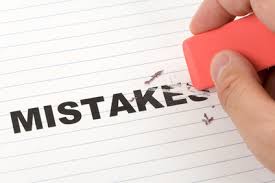5 Mistakes Startups Make, and How to Avoid Them
 Nobody said starting a brand new business from the ground up would be easy.
Nobody said starting a brand new business from the ground up would be easy.
Seasoned and novice entrepreneurs alike will be all-too aware of the eventuality of encountering obstacles and pitfalls whilst both setting up their business, and running it day-to-day.
So, if you want to start off your venture in the most efficient way possible, it can help to know about the mistakes you should avoid making.
Below is a list of five common mistakes made by startup businesses, and how you can avoid making them yourself:
1. Your business is based on a “cool” or “fun” product
If your business idea is product-based, make sure you’ve had more feedback than just “oh wow, that’s cool.” It’s great that your friends, family, and maybe even strangers you’ve trialled your product on find it “cool” or “fun” – but superficial positive feedback on a new product you’ve invented doesn’t make it worthy of setting up an entire business.
The key to a business-worthy product is one that solves a specific, existing problem, or fills a significant gap in the market. The Flappy Bird app is a good example; an addictive, fun game that was popular for the blink of an eye, but because it didn’t address a particular need, is now barely even acknowledged.
Give your customers something they’ll wonder how they ever coped without with the intention of using it regularly.
2. You haven’t formulated a proper business plan
It sounds obvious, but having a clear-cut business plan is a vital step that a lot of startups will miss. They’ll neglect to have a solid financial forecast in place, or get down to the nitty-gritty of how they’ll market their product or service to customers – so when it comes time to make waves, you don’t actually know how to tackle this.
You need a well-thought out roadmap for your business to travel; don’t just acknowledge that you “might need an investor from a bank… or something… maybe.” Instead, do your research before you get in too deep and create actual lists of specific contacts, loans, investments, and partners you intend to contact – or, better yet, have already looked into in some depth.
Have a clear product, purpose, customer base, and mission in mind. Don’t just know that you need KPIs; know exactly what those KPIs are. Decrease the likelihood of hitting roadblocks by having a business plan that’s as thorough as possible.
3. Your location is all-wrong
In this case, ‘location’ refers to the physical place you’re running your business from. Surprisingly, even if your business operates solely online, the actual location of your business can have a significant impact on how much success you’re likely to achieve in the long-term.
The right geo-positioning is based almost entirely on your target market; after all, it’s no good setting up a new store selling exclusively high-end fashion items for women on a strip full of budget clothing stores primarily for men. It’s therefore essential to incorporate the findings of your market research into the placement of your business.
A good example of learning from geo-positioning mistakes is the story of a little retail chain you may have heard of: Macy’s. Rowland Macy, the company’s founder, originally started off with a store in Massachusetts – but saw very little success due to the clientele in the area. By moving to Sixth Avenue in New York City, though, he opened up his business to his exact target demographic.
It’s even possible that had Mark Zuckerberg never relocated from his hometown and to the technology-hub of California, he could have significantly stunted the growth – possibly entirely – of Facebook.
4. You’ve given into too much outside influence
It’s important to avoid that feeling of disconnection to your own business - or even worse, to the passion that drove you to build your business in the first place.
Unfortunately, this is a feeling that can be brought about if you listen too much to the advice or visions of others. While criticism and feedback is obviously an incredibly important part of creating a business, it’s important that the advice given doesn’t directly contradict the core ideas behind your product or service. If this happens, you might find yourself wondering one day if you even understand what you’re trying to accomplish.
So, consider the advice of the experts around you – for example, Sean Parker’s advice to turn “Thefacebook” into “Facebook” was undoubtedly beneficial – but make sure that you maintain your personal vision every step of the way. The idea, the concept – it’s yours, so don’t let anyone else mess with it too much.
5. You’re target market is a tiny niche
Of course, there’s a huge benefit to targeting a niche market: less competition. However, at the bare bones of it, a lack of competition is a red flag indicating an unpopular concept.
Investor Paul Graham, the founder of startup incubator Y Combinator, perfectly explained this: “If you make anything good, you're going to have competitors, so you may as well face that. You can only avoid competition by avoiding good ideas.”
So, if you don’t mind sacrificing big profits for an easy ride, then targeting an exclusively small market could be ideal – but for businesses with big ideas and even bigger goals, it’s much better to put more effort into your market research and make sure you aren’t afraid of a little competition.
Kim Whitley is a writer for Make It Cheaper, a price comparison website committed to helping businesses save money . Follow her on Twitter for regular updates on her two biggest passions: business and the environment.

 Delicious
Delicious Digg
Digg StumbleUpon
StumbleUpon Propeller
Propeller Reddit
Reddit Magnoliacom
Magnoliacom Newsvine
Newsvine
Comments
Post new comment